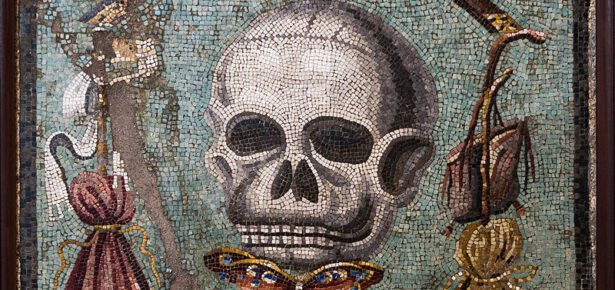
“Carpe diem” is one of the most recognisable Latin phrases: in our day it is a popular slogan on T-shirts; millions know the words through the movie Dead Poets Society, in which the actor Robin Williams in his role as English teacher tells his students: “Carpe diem. Seize the day boys. Make your lives extraordinary”. And recently a book that collected “quotes and mottoes for making the most of life” was published under the title “Carpe that f*cking diem” – illustrious company for my book with its slightly tamer title then. My book sets out to show why ancient Greek and Roman poets were fascinated with carpe diem.
The phrase carpe diem was coined by the Roman poet Horace, who lived in the first century BC. And though Robin Williams and almost everyone else translates carpe diem as “seize the day”, a more accurate translation would be “pluck the day”: we are asked to pluck the day and enjoy it like a ripe grape. At any rate, the expression carpe diem became a shorthand for a motif that tells us to enjoy life while we can: “eat, drink and be merry; for tomorrow we die”. Poets long before and after Horace made this the central message for their works.
The pleasures of life in carpe diem poems are sensuous pleasures: food, wine, music, sex. These were the pleasures that could be encountered at ancient banquets, that is, the Greek symposium and the Roman convivium. Poetry, too, is closely linked with banquets: in archaic Greece, carpe diem poems were sung at banquets. Such songs created present enjoyment at the same time as they praised present enjoyment. Later poetry was not designed anymore to be sung at banquets but to be written on scrolls. And yet even such written carpe diem texts attempt to evoke music and presence: texts seem to sing, resounding echoes seem to arise from the page. Carpe diem poems aim to transcend the page of the book and become truly present. The central question my book attempts to answer is how poems can do that: how can poetry give us the almost magical impression that something is happening here and now?
Horace’s poems give us an example for poetry that evokes the presence of the banquet to us and at the same time creates some distance between the banquet and us. A trademark of Horace’s poetry is vintage wines: time and again he tells us the precise year of a wine that he wants to serve at a banquet. Of course, it’s hardly surprising that poems about pleasures mention wine a lot, but the precision with dates goes further. Rich Romans possessed thousands of wine amphorae. Such amphorae could feature painted wine labels, which gave information on the year of the harvest or the appellation of the wine – comparable to our wine labels. I argue that this made Roman wine storage places into huge drinkable calendars, in which the oldest wines were stored at the back and the younger wines at the front. Like a calendar, Roman wine storage places offered a chronological sequence of dates. Every time Horace mentions vintage wines, he accesses this calendar. Time is expressed through wine: opening an old wine creates a moment of present enjoyment which cannot be repeated. Yet, through vintage wines Horace also brings moments of the past to the present. When Horace grabs a bottle, he also seizes the date. And as he brings a bottle to the banquet, he brings a moveable feast.
What has fascinated me during my research was that the idea of carpe diem was not limited to literature in the ancient world. Though no ancient Roman wore a T-shirt with the slogan, the idea was almost as ubiquitous in the ancient world as it is in our day and could be found in various contexts and media: tombstones included the sentiment; mosaics showed skeletons holding wine jars, which encouraged viewers to enjoy the pleasures of life while possible; gems and cups featured tiny images and inscriptions which prompted to carpe diem. Even the oldest song that survives complete with notation from ancient Greece is about carpe diem. In all these media, people were told to enjoy the pleasures of life. In my book I show how carpe diem poems aim to rival these other media: as poems mention cups, they try to give us the momentary enjoyment of holding a cup in our hand and drinking from it.
As Carpe diem poems attempt to transcend the page of the book, my book follows their lead and looks at the materials such texts evoked: wine labels, cups, gems, calendars and monuments. In my book I show, then, how Greek and Latin poems evoke a world of things as they urge us to seize the day.
Latest Comments
Have your say!